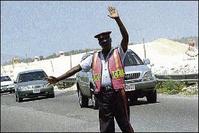Dr Paul Gyles, Contributor
More frequent collaboration between police and army personnel to set up spot checks on major roadways and major investigations would help in the crime fight. - file
Crime has escalated to the level wherein it appears to be threatening the progress of Jamaica in economic development and social advancement. It has become such an epidemic that it is affecting the existence of decent, law-abiding citizens of this beautiful country. The level of crime and the viciousness of crime seem to be so severe that the citizenry is numbed to its effects. This is likened to a patient who feels pain until it reaches a threshold, following which the patient lacks sensitivity to the pain. As Jamaicans, we are urged to rise up and conquer this scourge. Failing to overcome this monster will lead to anarchy and destruction.
Many strategies have been employed, but the Rapid Response Method, frequent amnesty for illegal weapons, recruitment of youth to the army for service and intense community policing, along with friendly community relations, are recommendations that need urgent analytical examination.
days of calm
The public seems to be relieved when five days go by and there is no reported crime or unrest in rural and urban areas. Following days of calm, suddenly there is a surge in crime. This pattern is clear, that crime seems to be very deep-rooted in the society. A few weeks ago, it was reported that five farmers had been shot in Crofts Hill, Clarendon. If the Rapid Response Method, outlined in 'Letter of Day', January 28, Gleaner, was employed the perpetrators would be caught and brought to justice. The public should be sensitised to the Rapid Response Method of law enforcement wherein collaboration between police and army personnel set up spot checks on major roadways and major investigations carried out throughout the communities and surrounding regions.
Frequent amnesty for individuals with illegal weapons will give individuals the opportunity to change and to be law-abiding citizens. When this opportunity is given and promoted, law breakers will see an alternative way. It should be made clear that following such admission of involvement, individuals would be offered, concession and forgiveness.
army recruitment
The Government should consider recruiting young men and women 18-30 years of age who are not employed to the army. They should be recruited and in the army they should be exposed to industrial skills that can be utilised in public works carried out by the government. At present, army personnel should be rostered in police stations to strengthen policing in communities. The army could be a reservoir for urgent security needed to solve crime problems.
Over the last 10-20 years there seems to be a deterioration in the relationship between the Jamaica Constabulary Force (JCF) and the communities. Although the JCF is busy, they need to send police into communities to make friendly visits which can be seen as courtesy calls on neighbourhoods. The citizens should be informed that this is deliberate and share with the communities their intentions or purposes.
These are recommendations that need to be examined thoroughly and explored. As concerned citizens, efforts and ideas need to be merged to eliminate this monster that is destroying the society.
Dr Paul Gyles is dean of the College of Natural and Applied Sciences, Northern Caribbean University, Manchester.

